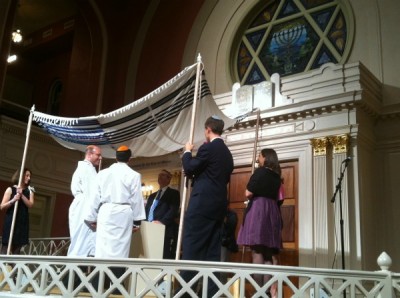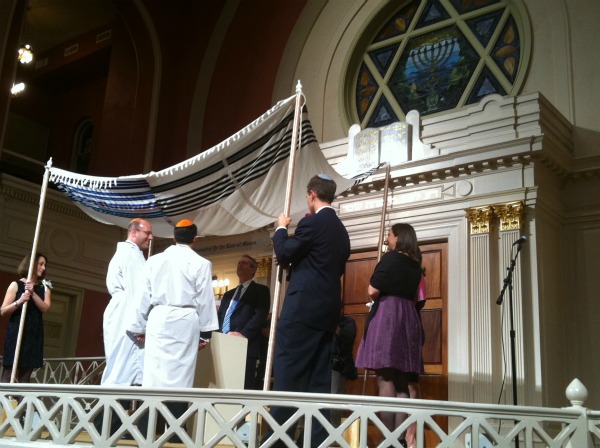On this weekend, five years ago, a community member of the synagogue in which I’d grown up stood up at the podium of my teen minyan, and talked about the verse in this week’s Torah portion — one that’s served as the basis for discrimination against queer Jews for decades.
I had just come out to my parents.

Even if many Jewish communities have taken important and concrete steps to welcome queer Jews into religious spaces, and made the necessary changes to our traditions to allow queer Jews to participate as their full selves in the Jewish community, the hurt that I and other queer Jews have experienced because of Leviticus 18:22 remains. Even though I left my childhood community, this Shabbat remains a difficult one for me — not because of the verse itself, but because of the fact that it remains the rationale for both the rejection and the acceptance of queer people in Jewish religious spaces.
The first thing that many Jews when they think of when they think of queer Jews is that biblical verse. The first step toward the acceptance of queer Jews, no matter their religious affiliation, has always been working around this verse and one other, two chapters later. However far we might have come as a Jewish community, the first step has always been dealing with the exclusion born of this one verse of queer Jews, especially queer Jewish men.
What hurts more than having the verse quoted or being used as a defense of bigotry is the knowledge that, to some people, my queerness can be distilled to just a few lines in the Bible, and the discussion ends there. When we limit the experience of Jewish queerness to just one verse, which discusses just one small fraction of what one’s experiences as a queer person entails, then we delegitimize the entire experience of being a queer Jew.
My queerness cannot be defined by just a verse in the Bible. Queerness, for me, has never been just about a biblical verse. It has been, at different times, a political identity; a community; a way of describing the people to whom I am attracted; and a critique of the world as I experience it. By reducing queerness as an experience to just this one verse, all other aspects of my queer identity are completely erased. That, at its root, is why this weekend is a painful one for me.
Feeling forced to respond, time and time again, to this one verse — to remind myself and others that there is so much more to being queer than a verse in Leviticus — is a painful reminder of the fact that, to so many today, queerness can still be distilled, as it was for the person giving the D’var Torah so many years ago, to just one verse, and just one act. This is not just a problem that Orthodox Jews face. Non-Orthodox Jewish communities must respond to this verse as well, and will continue to as long as it is used as a legitimate point of contention regarding Jewish inclusion in religious life.
The reduction of queerness to just a verse or two has sends a profound message to queer people, and it is not one that should be lost on us. That message is that our experiences as a person navigating through a world that was not originally built to accommodate or even acknowledge our existence is secondary to the fragility of a Bible verse.
If we continue to deliberate the different meanings of the verse, and use it as the proxy through which we debate the space that queer Jews deserve in Jewish communities, then the message that queer Jews hear is that the Torah is more insecure and important than our humanity. It is when we begin to fear for the supposed vulnerability of the Torah that our tradition becomes dangerous. The exclusion that results is not borne of a need to preserve the tradition that was handed down to us, but rather out of fear that the tradition might not otherwise endure if we put any part of it up to the challenges of the world in which we live.
If the Jewish community closes itself off to the experiences of queer people, and queer Jews, by limiting us to just a verse in the Bible, then the message that is sent is that the Jewish community cares more about the supposed fragility of a tradition which has endured for thousands of years — not despite change, but because of it.
I hope that this will be the last blog post that anyone writes about this week’s Torah portion. If we want to actually incorporate queer Jews fully into our communal spaces, then the time has come to stop responding entirely to Leviticus 18:22. If we continue to use it as the point of departure to discuss queer Jews, then we will never see queer Jews fully accepted within Jewish religious spaces.
Our tradition must continue to survive not because of this fearful act of distilling the queer Jewish experience, but despite it.
Amram Altzman is a student at List College.

